Iraq, a country rich in oil but lacking in efficient infrastructure, is facing an energy and water crisis exacerbated by extreme summer temperatures. In the southern Iraqi province of Diwaniya, protests are on the increase as residents suffer frequent power cuts and severe water shortages.
Popular discontent is palpable. On Monday, around 500 demonstrators blocked a main road by burning tires, expressing their frustration at a situation that is becoming untenable. Youssef Kamal, a resident of the village of Chafeïya, sums up the collective disarray: “We have no water, no agriculture, everyone has migrated to the towns to find work. There’s no electricity.”
Water and Energy Crisis
Power cuts are particularly unbearable in summer, when temperatures approach 50 degrees. Inhabitants were left without air conditioning or refrigeration, worsening their already precarious living conditions. Frequent power cuts, sometimes limited to one hour a day, have become a symbol of the authorities’ inability to provide basic services.
The shortage of running water further complicates the situation. Dozens of villages in the Diwaniya region are without water, as a direct result of drought and falling river levels. The crumbling water infrastructure is unable to meet the basic needs of rural populations.
Government reactions and measures
Prime Minister Mohamed Chia al-Soudani insists on the need to diversify energy sources to increase electricity production. Infrastructure maintenance and modernization work continues, but the results are slow in coming. At the same time, the repression of demonstrations is intensifying, with police interventions using tear gas and warning shots, as observed this weekend in the Ghammas district.
Demonstrators are calling for immediate and lasting solutions. “There’s no water, no electricity, no utilities, no roads, no mains drainage, it’s unfair,” says an anonymous protester, summing up the general feeling of despair.
Impact of climate change
Iraq is ranked among the five countries most exposed to the effects of climate change by the UN. The combination of rising temperatures and falling rainfall is making it increasingly difficult to manage natural resources. Climate projections for the coming decades predict even greater challenges for water and energy supplies.
The current situation in Iraq illustrates the global challenges posed by climate change and the need to adapt infrastructure and energy policies to ensure decent living conditions. The protests reflect growing despair and an urgent demand for structural reform.
Iraq must modernize its infrastructure and diversify its energy sources to meet the needs of its population. Recent demonstrations show that citizens are no longer prepared to accept the authorities’ inaction in the face of these simultaneous crises. An appropriate response could not only improve the quality of life of Iraqis, but also stabilize a region often marked by political and social instability.






















